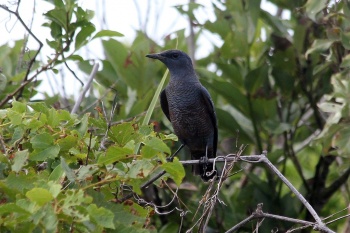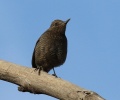- Monticola solitarius
Identification
20–23 cm (7¾-9 in)
Male nominate
- Blue-grey plumage
- Darker wings and tail
Female variable and immature
- Dark brown upperparts
- Pale brown scaly underparts
Distribution
Southern Europe, north-western Africa (wintering to north-eastern and central Africa), Siberia to central Asia to northern China and Malaysia.
Taxonomy
Subspecies
There are 5 subspecies[1]:
- M. s. solitarius:
- Southern Europe, north-western Africa and Middle East; winters to central Africa
- M. s. longirostris:
- M. s. pandoo:
- M. s. philippensis:
- M. s. madoci:
Habitat
Fairly conspicuous on exposed rocky slopes, road cuts even through forests, open areas including parks, and along rocky streams and rivers (on wintering grounds).
Behaviour
Breeding
They nest on steep cliffs in rock cavities and walls. The clutch consists of 3-5 eggs.
Diet
The diet vertebrates, small vertebrates, insects and fruit. Insects include grasshoppers, locusts and crickets.
Vocalisation
<flashmp3>Monticola solitarius (song).mp3</flashmp3>
Listen in an external program
Gallery
Click on photo for larger image
References
- Clements, J. F., T. S. Schulenberg, M. J. Iliff, D. Roberson, T. A. Fredericks, B. L. Sullivan, and C. L. Wood. 2018. The eBird/Clements checklist of birds of the world: v2018. Downloaded from http://www.birds.cornell.edu/clementschecklist/download/
- Avibase
- Handbook of the Birds of the World Alive (retrieved May 2018)
Recommended Citation
- BirdForum Opus contributors. (2025) Blue Rock Thrush. In: BirdForum, the forum for wild birds and birding. Retrieved 11 May 2025 from https://www.birdforum.net/opus/Blue_Rock_Thrush
External Links









